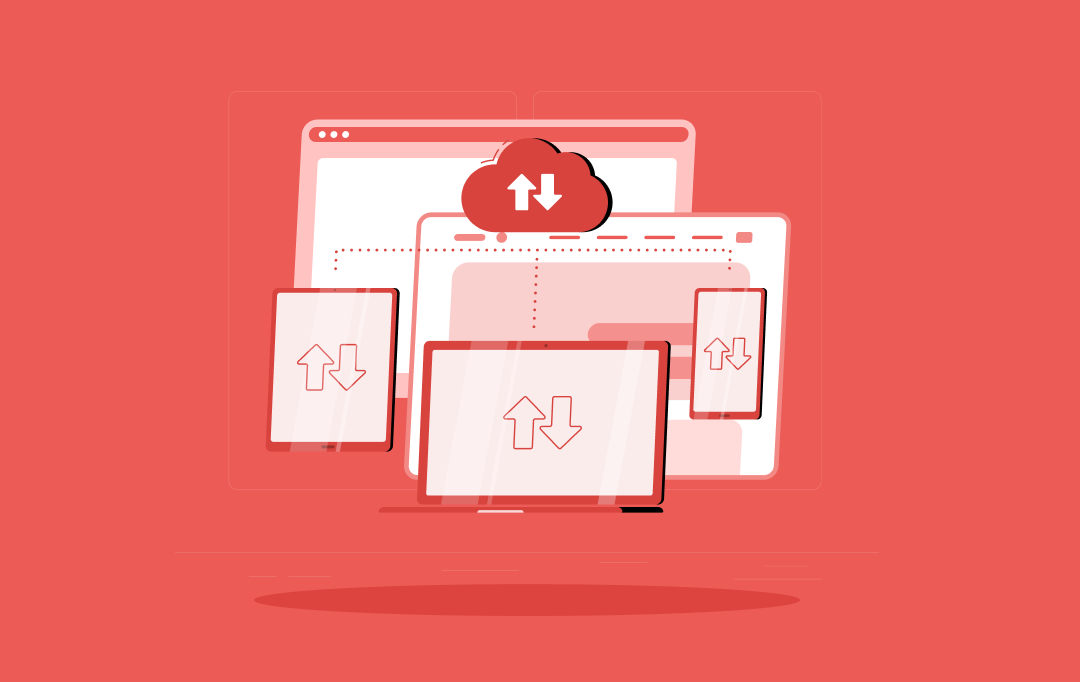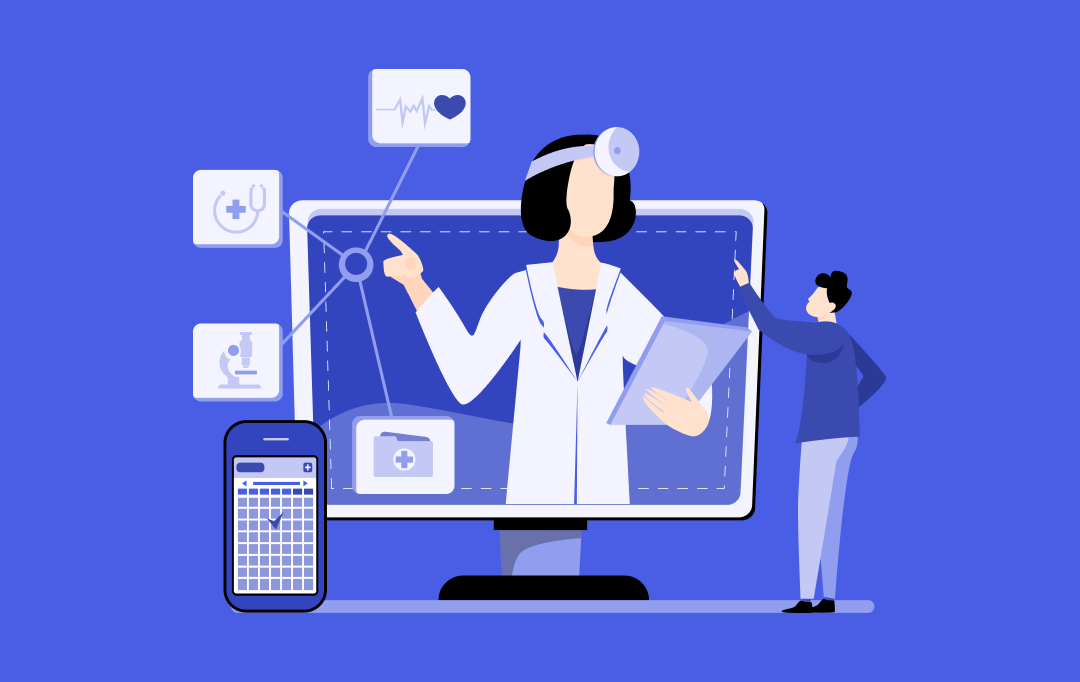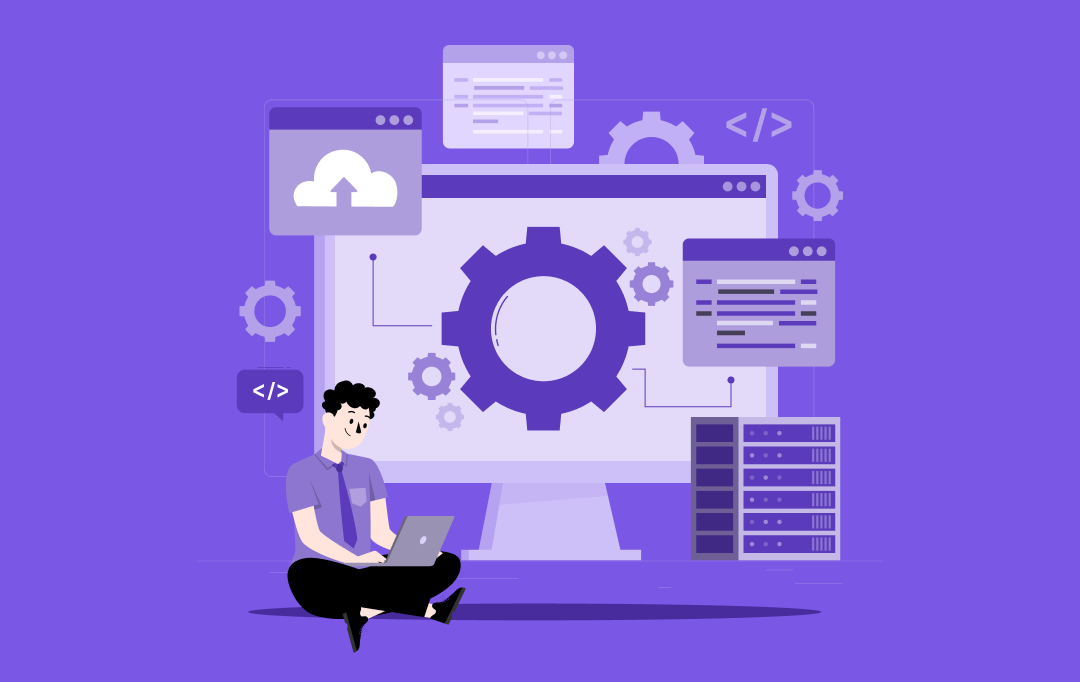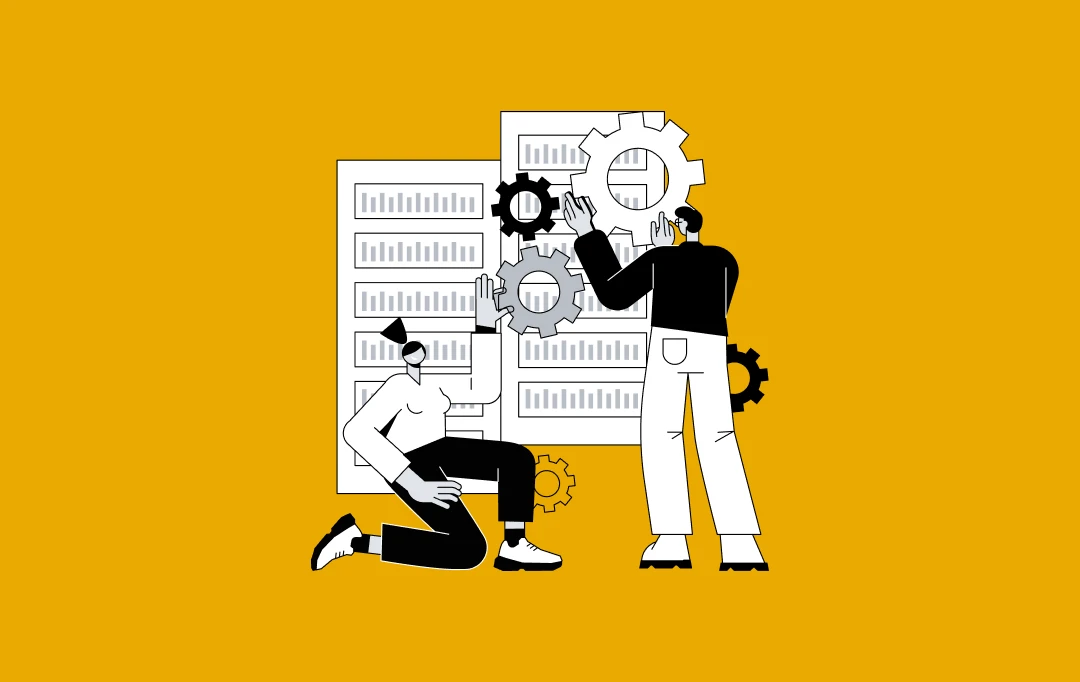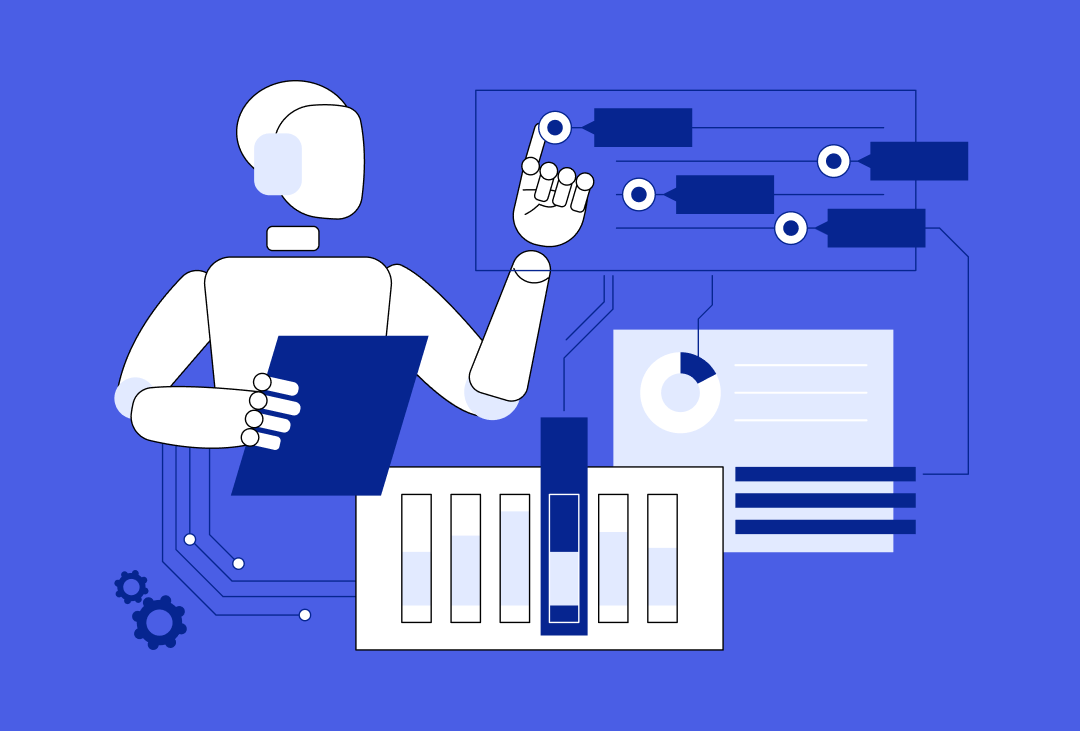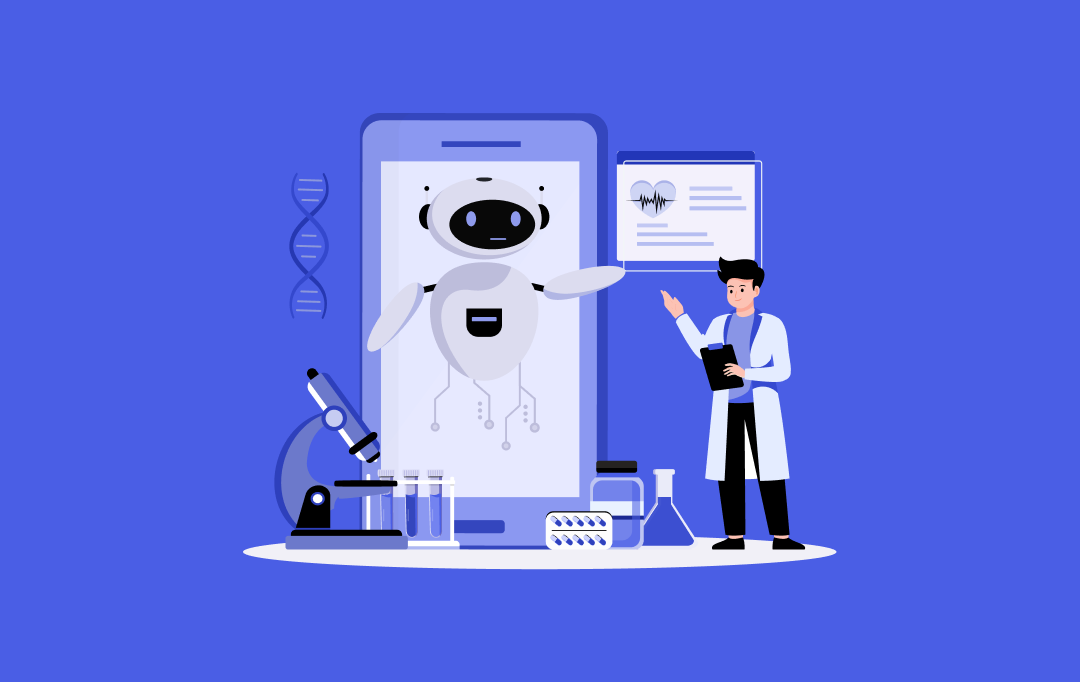Key takeaways:
- AI-Powered Personalization:
AI enables hyper-personalized nutrition plans by analyzing diverse data sources such as genetics, health metrics, and lifestyle habits, providing tailored dietary recommendations that evolve in real time.
- Revolutionizing Health Monitoring:
AI tools, like real-time food recognition and predictive models, help detect nutritional deficiencies and monitor health progress, leading to improved disease prevention and management.
- AI-Driven Meal Planning:
With AI’s ability to integrate data from wearables and IoT devices, it optimizes meal plans for chronic conditions, adjusts to real-time health data, and offers 24/7 support through virtual nutrition coaches.
While AI and ML are transforming the entire business landscape, their impact in dietetics and nutrition is particularly significant, reshaping how we understand and manage our health, and is no longer a novelty. Today, AI delivers a perfectly timed opportunity to deliver hyper-personal and scalable nutrition solutions by analysing vast health-related datasets.
According to News Medicle, a recent pilot study of six weeks on AI-driven personalized nutrition revealed some key findings:
- Dietary Changes – Participants reduced the surplus intake of carbs, proteins, sweets, and alcohol by 14-39%.
- Gut Microbiome – Following post-analysis, the results showed increased diversity and abundance in the gut microbiota.
- Measurements – While the majority of the measures remained unchanged, a modest decrease in waist circumference was observed.
- Correlations – Sweet intake decreased to a significant level.
These results revealed that AI in nutrition offers a promising tool for personalized health management, thereby increasing success and acceptance.
According to Data M Intelligence, the size of the Global AI in the personalized nutrition market reached $1.12 billion in 2024 and is forecasted to reach $4.26 billion by 2032, with a CAGR of 18.19% between 2025 and 2032.
With artificial intelligence in nutrition, including dietary assessments, food recognition and tracking, and predictive modeling for disease diagnosis and monitoring, AI applications in nutrition and diet planning are going to increase significantly, signifying the need for AI nutrition app development.
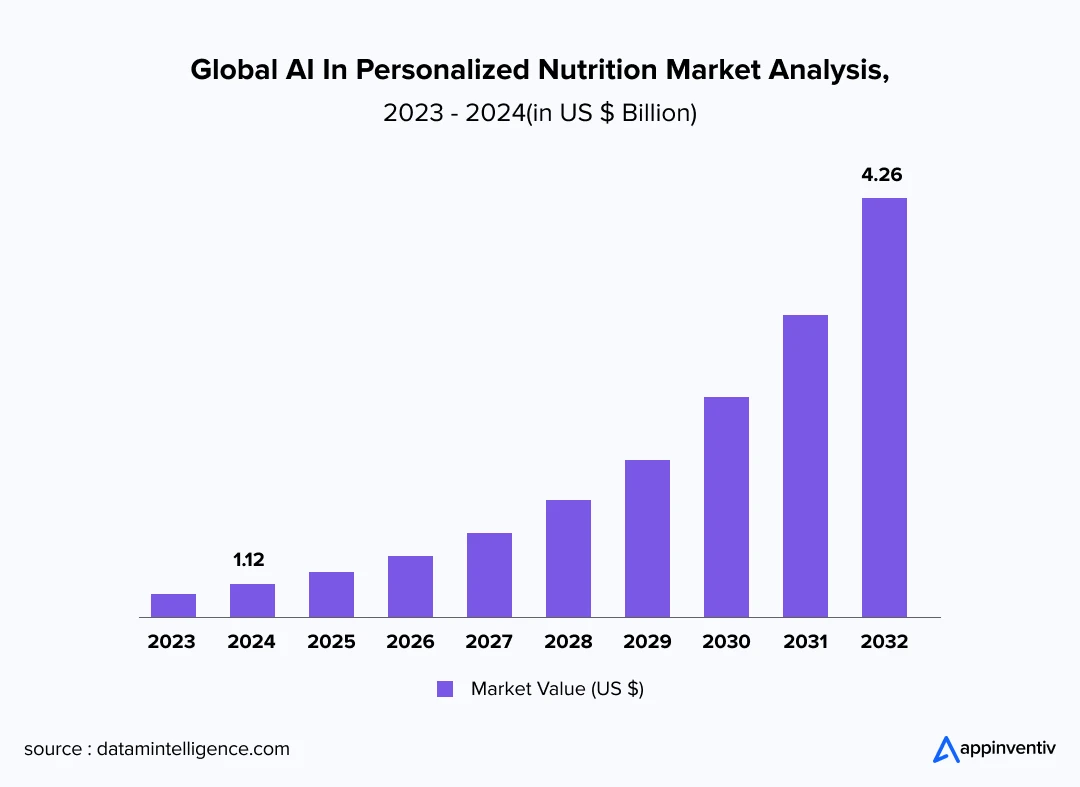
As the data shows that AI in nutrition and dietetics is incrementally booming, especially in personalized diet planning and health, it is highly relevant to go through its potential applications of AI in nutrition and diet planning revolving around decoding dietary patterns, predicting health risks, and analysing food content in real time, thus reshaping the future of how we eat, track, and optimize our overall wellbeing.
This blog will focus on 10 revolutionary applications of AI in nutrition and diet planning, as well as the core elements required to build the best nutritional AI app for your users.
10 Groundbreaking Applications of AI in Nutrition & Diet Planning
Beyond the general health and diet recommendations available, the innovative applications of AI in nutrition and diet planning leverage large datasets, involving profile analysis to provide real-time biometric feedback, thereby helping to develop customized nutrition strategies that further optimize health outcomes. Let’s explore 10 applications of AI in nutrition and dietetics, demonstrating how such enrollments are shaping the future of customized dietary management with AI.
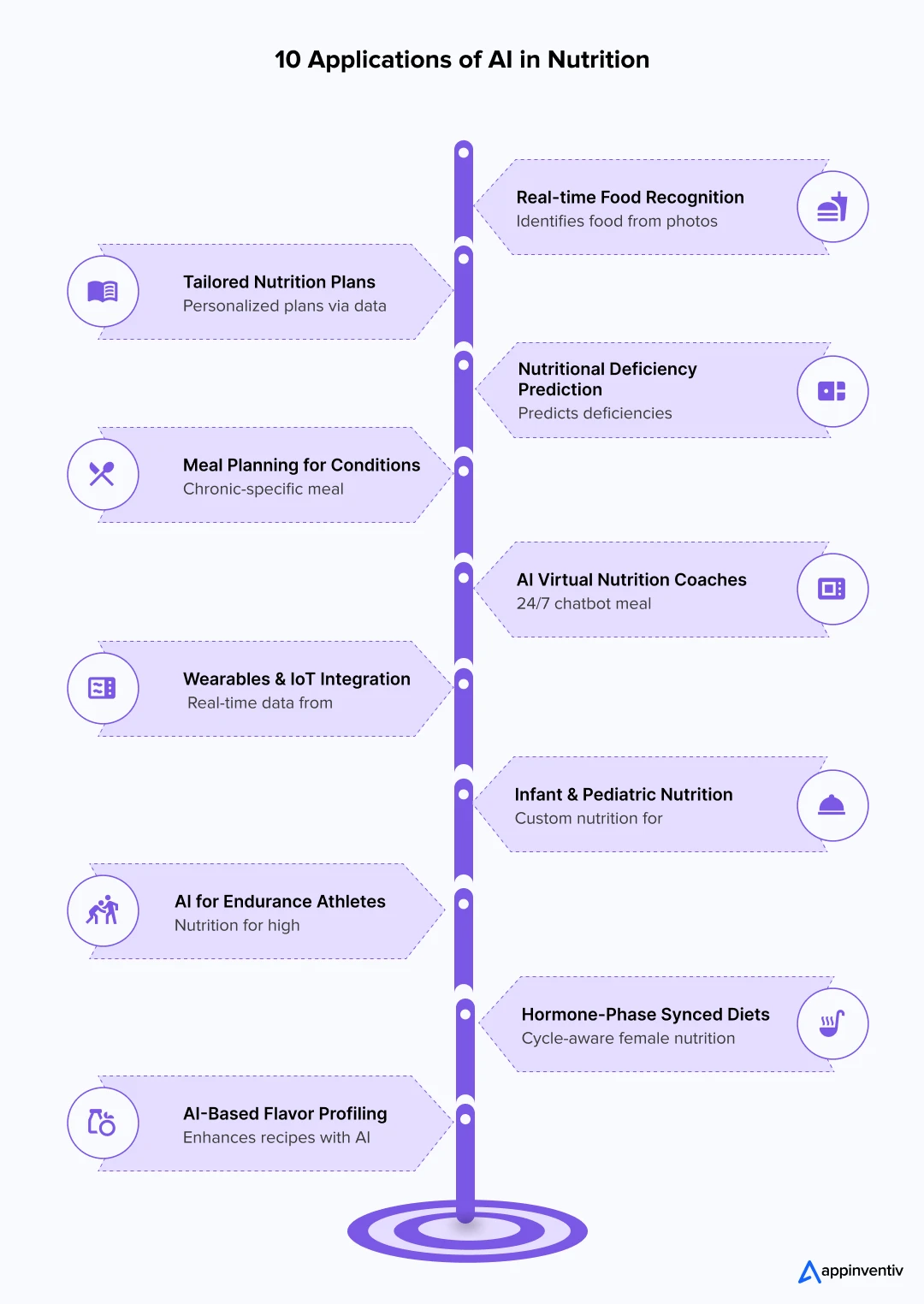
Food Recognition in Real Time
Real-time food recognition is a groundbreaking application of artificial intelligence in nutrition, leveraging computer vision in healthcare to identify and analyze food items by simply taking photos or videos. This transformative technology enables effortless tracking of your diet plan through simple photo uploads, and then AI models estimate variables related to nutritional content, such as calories, macronutrients, and portion sizes. This eliminates the need for manual entries.
- Nutritional Analysis: Provides immediate breakdown of calories, macronutrients, and micronutrients.
- Personalized Diet Tracking: Integrates with apps to align food choices with dietary goals (e.g., weight loss, diabetes management).
- Allergy and Restriction Management: Flags foods that conflict with dietary restrictions or allergies.
- Behavioral Insights: Tracks eating patterns to encourage mindful eating and habit improvement.
- Integration with Health Apps: Syncs with fitness or health platforms for holistic wellness tracking.
Real Example: Samsung Food Plus
For instance, Samsung introduced Samsung Food Plus, integrated with AI-driven features and aimed at simplifying meal planning and management through its iOS, Android, and web-based platform. Its key features included:
- Vision AI: The app’s capabilities include recognizing 40,000 ingredients, which is backed by cloud processing. Users can add food items by taking a picture of them.
- Food List Management: The app’s inherent capability to remove items from the food list once used and add purchased items back to the list is an innovative addition.
- Tailored Meal Plans: Suggestions are dynamically generated based on food lists, further prioritizing items that are nearing their expiration date.
- AI Guidance in Cooking: The app’s integration with Samsung Ovens allows it to control cooking settings, such as preheating and timers, further streamlining the cooking process.
Tailored Nutrition Plans
Personalized nutrition suggestions, powered by nutrition AI, represent exponential advancements in dietary science, enabling us to move beyond the traditional one-size-fits-all type recommendations. This move focuses on considering factors such as lifestyle habits, an individual’s genetic predisposition, and health conditions.
AI diet planning software offers personalized, efficient, and data-driven solutions. Here’s how:
- Personalized Meal Plans: AI analyzes individual health based on age, weight, and eating habits to suggest customized meal plans that align with nutritional needs.
- Real-time Nutrient Tracking: AI-powered apps track daily food intake and provide real-time feedback on nutrient consumption, helping users stay on track.
- AI-driven Recipe Recommendations: AI suggests recipes based on available ingredients, dietary preferences (e.g., vegan, keto), and health goals.
- Health Monitoring Integration: AI integrates with wearable devices (e.g., fitness trackers) to monitor vitals and adjust diet plans in real-time based on activity levels or health conditions.
Real Example: Twin Health
With Twin Health’s digital twin app, users get custom dietary recommendations based on multiple data points collected from sources like smartwatches, glucose monitors, and blood pressure cuffs. Analyzing the datasets, the app creates a feedback loop that recommends advice based on appropriate food orders to help regulate blood sugar more effectively.. With such a role of AI in nutrition, users can adopt healthier eating habits.
Nutritional Deficiency Prediction
AI in the food industry is enabling large service providers to adopt healthier food practices and deliver healthier options tailored to individual eating behaviors. Not only this, but major players who regularly adopt healthy food in their menus also provide a clear picture of nutritional content.
- Early Disease Detection: ML models detect diseases or nutritional deficiencies early by analyzing health data.
- ML Models in Health Data Processing: Gradient Boosting and Random Forests are popular for processing health data with accuracy and robustness.
- Predictive Analytics for Nutritional Deficiencies: ML models predict deficiencies by identifying hidden patterns in health data.
Real Example: NutriCare
The NutriCare AI-Driven Health Monitoring System is a prominent example of this use case. In the trial, the dietary intake of NutriCare users in terms of macro- and micro-nutrients was analyzed to identify areas of surplus and deficiency. Their system was successfully able to predict Vitamin D, Iron, and Calcium deficiency by detecting patterns in the user’s dietary habits. The overall testing demonstrated much higher accuracy and result reliability in areas like:
- Nutrient intake analysis
- Deficiency prediction
- Disease risk correlation
Meal Planning Optimization for Specific Conditions
Thanks to artificial intelligence in nutrition, the entire use case has transformed for how meal planning is approached for individuals with chronic health conditions such as diabetes, hypertension disorder, and gastrointestinal issues. What sets AI apart is its ability to integrate various data points, such as medical history and lab results, and then recommend meals that are not only effective but also practically enjoyable.
- Personalized Meal Plans: AI customizes meals based on specific health conditions (e.g., diabetes, hypertension), optimizing nutrient intake for individual needs.
- Real-Time Data Integration: AI adjusts meal plans in real time based on health data like blood sugar levels or heart rate.
- Portion and Timing Control: AI calculates optimal portion sizes and meal timings to align with medications or treatment schedules.
- Dietary Compliance Monitoring: AI tracks adherence to dietary restrictions, providing reminders and suggestions to support better health outcomes.
Real Example: National Library of Medicine
A study conducted by the National Library of Medicine to determine how similar use cases of the role of AI in nutrition could transform the industry by recommending personalized healthy meal plans based on their dietary restrictions due to an underlying health issue. Experts developed an AI Diet Planning app prototype to create customized meal plans. The app successfully generated meal plans via consideration of the following variables:
- Addressing individual health concerns and dietary restrictions
- Optimized nutritional value using fuzzy nutritional scoring
- Incorporating users’ taste preferences, budgets, cultural factors, etc.
Users reported high satisfaction with the app’s ability to offer customized meal plans based on their dietary restrictions.
AI-Powered Virtual Coaches
Among the numerous use cases of AI in nutrition and dietetics, one groundbreaking use case is that of AI-powered virtual coaches. These coaches offer personalized demand fulfillment via chatbots and voice assistants. These systems utilize advanced AI algorithms to analyze users’ health data, eating habits, and dietary preferences and then provide them with tailored recommendations, anytime, anywhere.
- Personalized Coaching: AI-powered virtual coaches analyze user data (goals, habits, preferences) to offer tailored fitness, diet, or mental health guidance.
- Real-Time Feedback: These coaches provide instant feedback on performance, adjusting plans or routines in response to progress and user interaction.
- 24/7 Availability: Virtual coaches provide continuous support, enabling users to access advice and motivation at any time, from anywhere.
- Behavioral Insights: AI tracks user behavior and adapts coaching strategies to enhance motivation and habit formation over time.
Also Read: NLP in Healthcare – 10 Applications, Use Cases and Benefits
Real Example: Numan
Numan, a digital healthcare provider, is working on its AI health assistant. Since October 2024, this has been in a beta testing phase and is being designed to provide the benefits mentioned above. To date, over 3000 patients have participated in the rollout.
This approach is related to addressing the critical need for personalized solutions that can both scale and simultaneously address the stigma attached to certain health conditions, such as obesity. Such an integration of AI in nutrition sets a precedent for focusing on patient safety and clinical effectiveness, all of which can be achieved through AI.
Integration with Wearables and IoT Devices
Integration with wearables and IoT devices falls into the necessary process of implementing AI in nutrition. This integration marks a major advancement in personalized health and wellness. Smart devices, ranging from fitness trackers to glucose level monitors, smartwatches, and other health sensors, collect real-time data from various parts, which is then fed into the AI model for further processing.
- Real-Time Monitoring: AI tracks health metrics, such as heart rate and steps, from wearables for instant feedback.
- Personalized Adjustments: AI customizes plans based on data from IoT devices, such as activity levels.
- Automated Alerts: AI sends notifications for abnormal readings and suggests corrective actions.
- Data Synchronization: Wearables and AI sync for a comprehensive health overview.
- Predictive Insights: AI predicts health trends using historical IoT data, offering proactive recommendations.
Real Example: MDPI Study
The MDPI study demonstrates how elderly care quality, safety, and independence can be enhanced while reducing home care costs and the burden on caregivers. The results came out to be astonishing:
- The integration of AI in nutrition and dietetics, facilitated by wearables and IoT devices, resulted in a 9.8% reduction in data processing time and an enhancement in patient survival rates.
- Personalized nutrition has helped reduce medical resource wastage for patients with chronic diseases.
- It also enabled the early detection of health issues, allowing for timely intervention.
- It helped facilitate the efficient use of long-term care resources, thus being cost-efficient.
AI for Infant and Pediatric Nutrition
The use case of AI in diet planning has now extended to AI for infant and pediatric nutrition. AI systems can now analyze complex data patterns from multiple scenarios, including feeding behaviors, growth measurements, genetic information, and allergy history, and then generate personalized nutritional recommendations for children from birth to adolescence.
- Nutrient Deficiency Detection: AI identifies potential nutrient gaps and suggests foods or supplements to address deficiencies.
- Parental Guidance: AI offers real-time advice to parents on portion sizes, meal timing, and feeding techniques to support optimal growth.
- Health Progress Tracking: AI monitors and analyzes pediatric health data, offering insights to optimize nutrition and development.
Real Example: Stanford Medicine Study
A Stanford Medicine study published in Nature Medicine shared some strategic improvements in this area. They trained their AI algorithm on more than 80,000 historical data points and prescriptions of over 5900 participants. This enabled them to predict nearly accurate nutrient needs, and the outcome is as follows:
- AI was able to identify about 15 standardized IV nutrition formulas that closely matched expert prescriptions, simplifying the overall time-consuming process of suggesting customized prescriptions.
- AI could dynamically adjust recommendations according to the infant’s growth and changes in its medical conditions.
- During blind tests, neonatologists preferred AI-suggested prescriptions over actual past prescriptions.
- In addition, external validation with data from UCSF (63,273 prescriptions for 3,417 patients) further confirmed the AI’s predictive accuracy. [Source: Lucile Packard Foundation]
AI for Extreme Endurance Athletes
Artificial Intelligence for nutrition can take on a significant role in supporting the nutritional needs of extreme endurance athletes. This integration typically refers to AI systems designed specifically to measure nutritional requirements for endurance athletes competing in events such as marathons and triathlons.
- Injury Prevention: Detects movement risks and suggests corrective exercises.
- Recovery Optimization: Recommends rest, nutrition, and hydration based on recovery needs.
- Data Insights: Analyzes performance trends to optimize future training.
Real Example: ResearchGate Study
A research paper published on ResearchGate, based on the measurement of percentage improvements of using nutrition AI to analyze the nutrient intake of high endurance athletes. It revealed positive insights:
- An ULTRA-Q questionnaire was used to effectively evaluate the nutrition knowledge of AI models, particularly popular ones such as ChatGPT 3.5, ChatGPT 4, Bard, and Copilot. The results showed that ChatGPT 4 scored the highest with 93%, followed by Copilot at 92%, Bard at 84%, and then ChatGPT 3.5 at 83%.
- On average, AI outperformed the general population by 31 points, and registered dieticians in fluids and supplements by 49 and 58 points, respectively.
- Moreover, AI models showed notable strengths in supplements, fluids, and body composition.
Hormone-Phase Synchronized Nutrition for Women
Hormone-Phase Synchronized Nutrition for Women is a notable example that demonstrates the smartness of AI for nutrition, among the various use cases of AI in nutrition and dietetics. Rather than recommending daily diet suggestions, its approach revolves around distinct phases of a woman’s menstrual cycle. Then it suggests a personalized nutrition plan accordingly, rather than a static diet plan.
As estrogen, progesterone, and other hormone levels fluctuate throughout a woman’s cycle, a woman’s body starts to process nutrients differently, depending on macronutrient requirements for optimal functioning of their body. As the ovulation phase approaches, an AI diet planning app can identify the need and suggest foods rich in antioxidants and micronutrients, such as zinc and selenium.
- Hormonal Cycle Integration: AI adjusts nutrition based on the woman’s menstrual cycle phase (e.g., follicular, luteal).
- Symptom Relief: Suggests foods to alleviate symptoms like bloating, fatigue, or cravings during specific phases.
- Long-Term Optimization: Tracks data over time to refine nutrition strategies and improve overall well-being.
Real Example: Orchyd App
Orchyd App, with its Blossom AI, represents one of the most innovative examples of AI in nutrition, specifically designed for women’s health. Initially launched as a free menstrual cycle tracker, it has now distinguished itself from others by introducing Blossom AI, which leverages GPT technology to deliver extremely personalized guidance to women.
Unlike conventional period trackers, Blossom AI analyzes a woman’s unique menstrual patterns and other symptoms to provide tailored recommendations, a perfect example of AI in nutrition.
Flavor Profiling Using AI
The transformative role of AI in nutrition has led to an innovative use case of AI-based flavor profiling. This transformative use case of AI for nutrition utilizes sophisticated algorithms to analyze and map the complex world of flavor, thereby generating strategic ingredient combinations to satisfy the palate.
However, AI has changed the scenario. The core of this feature is built upon computational gastronomy. Modern systems for artificial intelligence for nutrition can analyse several ingredients, their aromatic volatile compounds, taste active components, and their textured profiles.
- Personalized Flavor Preferences: AI analyzes taste data to recommend flavors based on individual preferences.
- Recipe Customization: AI suggests ingredient combinations that match flavor profiles and dietary goals.
- Trend Prediction: AI identifies emerging flavor trends, helping brands develop innovative products.
- Flavor Consistency: Ensures consistent flavor in mass-produced products by analyzing and optimizing ingredient ratios.
Real Example: Science Direct Study
Science Direct published a study on the role of AI in flavor enhancement. It revealed how AI algorithms could be applied to flavor-related tasks. The application generated the following results:
- In coffee flavor predictions, it achieved 75% to 77% accuracy, and recall rates improved by 73%. Furthermore, CNN (Convolutional Neural Networks) models used for peanut oil olfactometry predictions achieved an accuracy of around 93%. This showcases strong potential for decreased reliance on human sensory evaluation.
- In terms of analyzing beer flavor, an AI-enabled predictive tool reported improved accuracy.
- Other machine learning models attained over 85% classification accuracy in odor perception analysis. [Source: Science Direct]
AI-Powered Diet Planning Platforms are Transforming Nutrition: Benefits of AI in nutrition and dietetics
The impact of AI in dietetics and nutrition has fundamentally changed the entire food and diet planning landscape. Modern AI diet plan software doesn’t just ask about basic metrics like height and weight; it also utilizes data such as genetic predispositions and the circadian rhythms of your insulin responses.
AI diet plan applications are making diet plans more intelligent, personalized, and adaptive. Using machine learning models and real-time data tracking, these platforms can analyze your goals, activity levels, preferences, allergies, sleep, and even hormonal cycles (yes, really!) to suggest meals that evolve with your lifestyle.
Take this: Instead of saying, “Eat 1800 calories,” your AI nutrition coach says, “Based on your sleep, stress, and current PMS phase, you may benefit from an extra 300 calories from magnesium-rich foods today.” Now that’s smart.
The benefits of AI in nutrition and dietetics include:
- Hyper-personalization: AI considers not just weight and age, but gut health data, genetic profiles, blood glucose trends, menstrual cycles, and more to craft diet plans tailored to the individual. This is among the many significant advantages of AI in nutrition.
- Real-time adaptation: Unlike static meal plans, AI adjusts recommendations daily based on your health tracker data, workouts, sleep, hydration, etc.
- Behavioral nudges: Through NLP and psychology-driven prompts, AI gently encourages healthier decisions (“You’ve skipped breakfast three times! Want a 5-minute smoothie idea?”).
- Data-backed decisions: AI processes clinical data, food reactions, user behavior patterns, and research to recommend diets with a higher success rate.
- Accessibility: These platforms make expert-level diet planning available to the masses, without needing a full-time nutritionist.
Core Elements of Building the Best AI-Based Nutrition App
The implementation journey begins with extensive data collection and algorithm development, followed by rigorous testing phases that validate the AI’s recommendations against established nutritional science. Developers must ensure that the system can accurately interpret complex nutritional requirements while remaining sensitive to individual differences in metabolism and health conditions.
The final stage involves creating intuitive user interfaces that present sophisticated nutritional guidance in accessible, actionable formats. This careful implementation process ensures that users receive science-backed recommendations tailored to their unique needs.
Bonus Read: How Much Does a Diet and Nutrition Planning App Cost?
Personalization Layer
Advanced AI nutrition app development platforms go beyond basic caloric calculations by incorporating a multifaceted understanding of individual users. This layer analyzes specific dietary requirements, whether based on ethical choices (such as veganism), health conditions (such as celiac disease), or weight management goals (such as a ketogenic diet).
The most sophisticated systems also account for psychological factors like emotional eating triggers, food preferences, and behavioral patterns that influence adherence.
Recommendation Engine
The intelligent suggestion mechanisms of AI nutrition apps transform raw nutritional data into practical, actionable guidance. These systems curate personalized recipe recommendations, meal preparation strategies, and shopping lists that align with both dietary requirements and lifestyle constraints.
The recommendation engine bridges the gap between nutritional theory and real-world implementation by taking into account seasonal ingredient availability, budget considerations, cooking skill levels, and time limitations.
Feedback Loop
The continuous improvement mechanism of AI nutrition systems represents perhaps their most valuable feature for long-term success. By monitoring user compliance, physical responses, subjective experiences such as hunger and satisfaction, and progress toward goals, these systems gather crucial data to refine their recommendations.
This iterative process creates a virtuous cycle where each adjustment improves the alignment between dietary suggestions and individual needs. The future of AI in nutrition and diet planning ultimately depends on these sophisticated feedback mechanisms that enable increasingly personalized and effective nutritional guidance.
AI for Diet Planning: How It Can Be a Revenue-Boosting Opportunity for You?
With rising interest in personalization and preventive health, the demand for smart, data-driven nutrition solutions has surged. Behind every Best AI nutrition App, there’s a layered tech stack, diverse data sources, and carefully trained algorithms designed to offer more than just calorie tracking; they offer adaptability, context-awareness, and health relevance.
- Creating such a platform demands expertise in nutrition science, behavioral psychology, and machine learning. This is where the process of implementing AI in Diet Planning becomes both technically challenging and strategically rewarding.
- The process begins by organizing datasets, including food, biometrics, and behavior. ML models then generate personalized diet recommendations based on user data such as allergies, fitness goals, and sleep patterns.
- Moreover, AI nutrition app development must ensure the system remains dynamic. The value lies in its ability to learn and adjust over time, adapting future suggestions based on habits such as skipping breakfast or eating heavier dinners after a workout.
Why to Choose Appinventiv as Your AI Nutrition Tech Partner
In the rapidly evolving landscape of AI in nutrition solutions, transforming innovative concepts into market-ready applications requires specialized expertise. Appinventiv serves as your strategic partner in navigating the complex journey from vision to implementation in the AI nutrition and diet planning sector.
Through our end-to-end AI consulting services, we specialize in AI-powered nutrition app development, transforming ambitious visions into market-ready solutions that deliver measurable value to users, bridging the critical gap between innovation and successful implementation.
Our team brings comprehensive technical expertise in integrating the diverse data sources essential for effective nutrition applications. From wearables to health records, we build secure data pipelines that maintain privacy while enabling the continuous flow of information required for personalized dietary guidance.
This foundation supports the sophisticated machine learning models our data scientists develop, algorithms capable of identifying subtle patterns between dietary choices and health outcomes, continuously improving through rigorous validation against established nutritional science.
Appinventiv’s recommendation engines transform complex nutritional analysis into practical, actionable guidance. Our algorithms generate contextually relevant suggestions based on user preferences, dietary requirements, and real-world constraints, such as ingredient availability and preparation time. These systems provide the crucial bridge between theoretical knowledge and daily implementation, significantly improving user adherence to dietary recommendations.
Key Implementation Capabilities:
- Custom machine learning model development optimized for nutritional pattern recognition
- Comprehensive food databases with cultural and regional adaptations
- User-centric design that balances scientific precision with accessibility
- Continuous improvement frameworks that measure and enhance effectiveness
Consult our AI experts and discuss your tailored needs now.
Frequently Asked Questions (FAQs)
Q. What is the role of AI in personalized nutrition?
A. AI revolutionizes personalized nutrition by analyzing vast datasets from wearables, food logs, and health records to create truly individualized dietary guidance. One of the benefits of AI in nutrition and dietetics is that it includes advanced algorithms that identify subtle patterns between eating habits and physiological responses, enabling recommendations that adapt in real-time to changing needs. Beyond basic caloric calculations, AI systems consider psychological factors like emotional eating triggers and food preferences, significantly improving long-term adherence.
Q. What is AI in nutrition?
A. AI in nutrition leverages machine learning algorithms to analyze personal health data and create highly individualized dietary recommendations. These systems process information from multiple sources, including wearables, food logs, and health metrics, to establish connections between eating patterns and physical responses. AI nutrition platforms continuously adapt their guidance based on user feedback and changing circumstances, offering precision and personalization that traditional diet plans cannot match.
Q. What is the cost to develop an AI nutrition app?
A. Developing an AI nutrition app typically costs between $50,000 and $300,000, with price variations depending on complexity, feature set, and data integration requirements. Simple applications with basic food logging and recommendation capabilities represent the lower end, while comprehensive platforms with advanced machine learning models, wearable integration, and personalized coaching features command premium prices. Additional factors affecting cost include database development, regulatory compliance measures, and ongoing maintenance requirements. The investment generally reflects the sophistication of the AI algorithms and the depth of personalization the application provides.
Q. Can AI make a diet plan?
A. AI can create highly personalized diet plans by analyzing individual health data, nutritional requirements, and eating preferences. Modern AI systems integrate information from wearables, food logs, and health records to develop recommendations tailored to specific goals like weight management or athletic performance. These platforms continuously refine their suggestions based on user feedback and physiological responses, adapting to changing circumstances, unlike traditional static diet plans.
Q. Can you use AI to lose weight?
A. AI can significantly enhance weight loss efforts by creating personalized nutrition plans that adapt to your changing needs and responses. These systems analyze your metabolism, activity levels, and eating patterns to determine optimal caloric intake and macronutrient distribution specifically for your body. Advanced AI applications monitor your progress continuously, making real-time adjustments based on your results while identifying potential barriers like emotional eating triggers or lifestyle constraints.
Q. How AI is transforming Diet Planning?
A. AI is revolutionizing diet planning by replacing generic nutrition advice with deeply personalized recommendations based on individual biometric data, preferences, and health goals. Machine learning algorithms analyze patterns from wearables, food logs, and health metrics to understand how specific foods affect each person uniquely, enabling nutrition plans tailored to individual metabolism and responses. These systems continuously adapt to changing circumstances, adjusting for factors like sleep quality, stress levels, and physical activity, creating dynamic guidance rather than static meal plans.
Product Development & Engineering
IT Managed & Outsourcing
Consulting Services
Data Services
Didn't find what you're looking for? Let us know your needs, and we'll tailor a solution just for you.